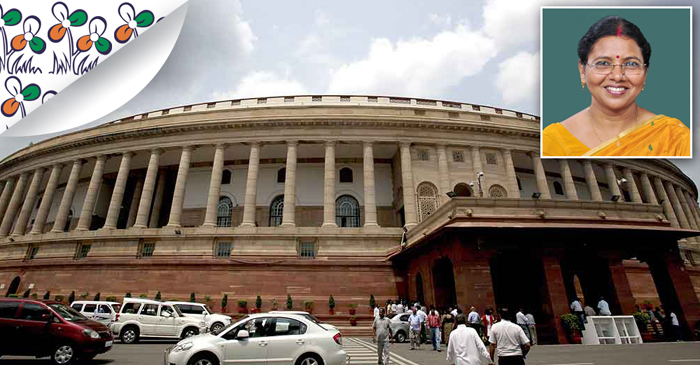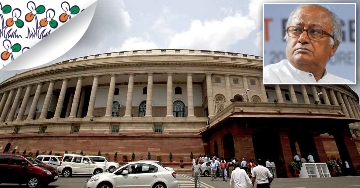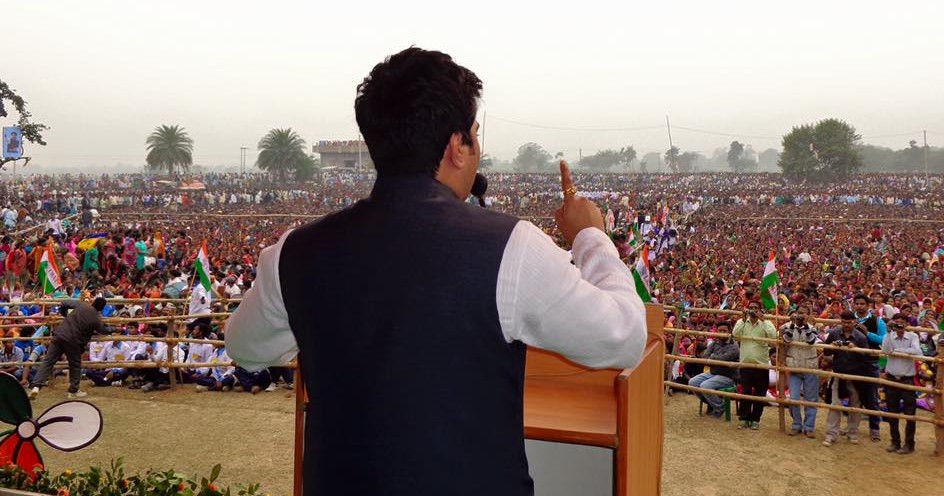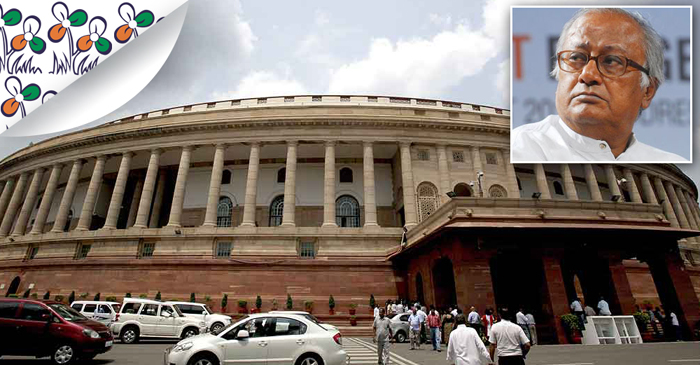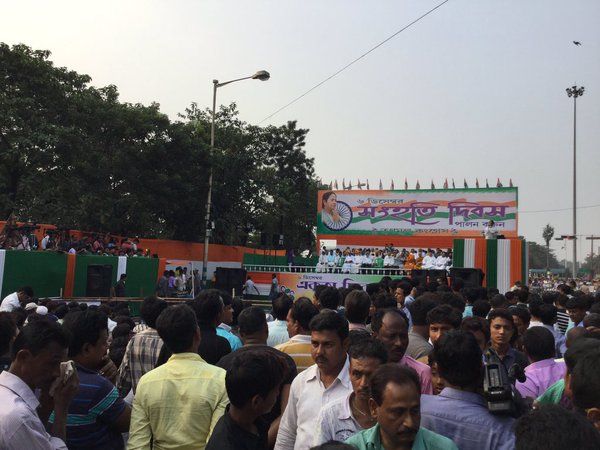Madam Chairperson, I rise to support the Atomic Energy (Amendment) Bill, 2015. As the hon. Minister has himself pointed out that these are minor amendments. He was referring it mistakenly as the National Power Corporation. It is the Nuclear Power Corporation of India. He has mentioned it as National Power Corporation.
The Amendment Bill allows the Nuclear Power Corporation to tie up with the public undertakings to form new energy producing units. He has already mentioned two companies – the Indian Oil Corporation (IOC), a giant public sector undertaking and the National Thermal Power Corporation (NTPC) — who have expressed willingness to go into and join such undertakings. I think, to that extent, it is a welcome stop.
Having said that, let me raise some basic matters about nuclear power in the country as a whole. Madam, as you know that the story of nuclear power starts in 1939 when two German scientists, Hahn and Fritz Strassmann, discovered nuclear fission. They discovered that if a heavy nucleus splits, it will release tremendous energy accordingly to Einstein’s Formula of E=mc2. After fission was discovered, the American scientists working under Enrico Fermi first built the controlled reactor below a football field in Chicago University.
How terrible nuclear energy can become, was demonstrated first in Las Alamos Lab where Robert Oppenheimer, the Chief of the project, called it brighter than a thousand Suns. The atomic bombs were exploded on Hiroshima and Nagasaki on 6th August, 1945 and 9th August, 1945 leading to surrender of Japan in the 2nd World War.
After the two nuclear explosions, we have discovered thermo nuclear bombs also. But there has been no open explosion of nuclear bombs because now humanity knows that we have the capacity to destroy this earth many times. But, whether you use it first or later, it is total annihilation. So, the attention has gone into peaceful uses of nuclear energy.
Now I must pay my regards, tributes to Pandit Jawaharlal Nehru, our first Prime Minister who envisaged that nuclear energy can be used for peaceful purposes. So, soon after we became independent, he set up the Atomic Energy Commission under Dr. Homi Jehangir Bhabha with the first unit at Trombay. There, controlled reaction was tried out in our first swimming pool reactor called, Apsara, and secondly in a zero energy reactor called ‘Zerlina’.
The thought of having nuclear power plants came much later in the late 50s’ and early 60s’ and then it was thought, when we were going to set up the first nuclear plant in Tarapur, that there should be a separate public sector organisation for manufacturing nuclear energy. Then, the Nuclear Power Corporation was established in 1962. One by one, there have been many nuclear power plants which have been set up, starting with Tarapur in Maharashtra, going to Rana Pratap Sagar in Rajasthan, Kalpakkam in Tamil Nadu, Narora in Uttar Pradesh and Kaiga in Karnataka.
Now there are a number of nuclear power plants throughout the country. Now this was not good enough. I remember when I was in Parliament in the 70s’, every week we used to raise Call Attention Motion on whether the Americans supply us with enriched uranium because the fuel of the Tarapur nuclear plant was uranium and the Americans used it as political leverage. Slowly, we have come out of that position where we have to depend on enriched uranium imported from America. Madam, even you would be aware that now we have gone to the next stage. We have built a fast breeder reactor, called BHAVINI near Mahabalipurm temples.
As Members of the Public Undertakings Committee, we went to see. It is almost ready. I do not know if it has started commercial production yet. But it is almost, entirely fabricated by Indians. Fast breeder reactor has the advantage that we produce our own fuel. The breeder itself creates plutonium. So, we will be less dependent on imported fuels.
The next step we have to take is to manufacture nuclear energy from thorium because we have large deposits. We do not have enough uranium in the small mines in Jharsuguda and in one or two other mines but we have enough thorium on the monazite sands of Kerala. If we can have a nuclear reactor based on thorium, then the problem of nuclear fuel would be solved forever. Now that work is on.
The scientists of the Atomic Energy Commission have proved extremely capable and they are a pride of the country. So, at this stage, we must pay our tribute to Pandit Jawaharlal Nehru and Dr. Homi Jehangir Bhabha. Now we should discuss nuclear power. What are the advantages? The advantage is that it is clean energy. It spews nothing into the atmosphere. It is small and compact. There is a reactor core and there are cadmium rods to temper the fission reaction which takes place within.
Its biggest advantage is that it is clean. But two problems remain. One is disposal of spent fuel. Whatever radioactive mass remains in the core, the problem is how to remove it and where to put it. They normally put it in lead containers and submerge them deep into the sea. So, there remains the problem of radioactivity spreading. But the biggest problem is with regard to accidents.
Madam, you would know that there have been three nuclear power accidents in the world. The first accident took place at the Three Mile Island near New York. The second and the most horrible accident took place at a place called Chernobyl in Belarus which was under the Soviet Union and nobody knows how many people died. The latest one was in Japan when the tsunami entered into the nuclear power plant at Fukushima. Japan was totally dependent on nuclear power.
Japan and France are two countries which are advanced in nuclear power. After the Fukushima accident, Japan closed down all its nuclear power plants and has not started all of them again. Safety considerations are very important as far as nuclear power plants are concerned. The Minister must keep all these things in mind – secrecy of our technology and safety of the nuclear plants. Madam, you would remember that in 2008, Dr. Manmohan Singh signed the Indo-US Nuclear Treaty.
After Pokhran-II in 1998, there was a ban on countries to supply nuclear fuel to India. Dr. Manmohan Singh, in order to break that blanket ban, went in for that Indo-US Nuclear Treaty, but the problem remained that to enter into nuclear commerce – to buy nuclear reactors and nuclear materials from other countries – we had to have a Civil Nuclear Liabilities Act to clearly mention that in case of accident, who will take the liability. Such an Act was enacted in 2011.
If I may say, we have had some trading with Russians. Tarapore plant was built with American help. The Russians have built the power plant at Kudankulam in Tamil Nadu, near the southern tip of India at Kanyakumari. Now, Kudankulam has reached the critical mass and is producing electricity. All my friends from Tamil Nadu are very happy about it. Madam, still we are not getting the sort of nuclear trade that we had expected. One of the impediments is the Civil Nuclear Liabilities Act.
According to our Act, the main liability for the accident will have to be borne by the supplier, those who are supplying the equipment. They say that there are primary suppliers and secondary suppliers and unless we amend this Act, they shall not come and invest in nuclear technology in the country. I would like to know from the hon. Minister what progress our country has made in nuclear trade and commerce, and in enacting an amended version of the Civil Nuclear Liabilities Act. Madam, the Minister is taking one further step.
It was said that the Department of Atomic Energy controls all nuclear power, Nuclear Power Corporation Limited and BHAVINI – Bharatiya Nabhikiya Vidyut Nigam Limited which has the fast breeder reactor near Mahabalipuram. Now, he is trying to open it up to others so that Indian Oil Corporation which has a big surplus can invest in nuclear field, so that NPTC which is already into power generation can also participate.
There is nothing wrong, but I would like to know this from him. How much confident he is that there they will be able to offer maybe capital, but what expertise can NTPC or IOC offer to nuclear power? How are we going to do nuclear power in the future? Where would we buy our reactors? Where would we buy our nuclear raw materials? How would we ensure the safety of the new power plants, which are being built?
Madam, as I said, this is the 70th year of the destruction of Hiroshima and Nagasaki in a nuclear bomb. The country and the world have made long strides since then. Nuclear energy has seen its ups and downs. Now, after the Paris Summit where we have all promised that we will not let the temperature rise by more than 2°C, fresh thought is coming into non-coal ways of energy production. Definitely, nuclear energy can provide a big fillip to that.
I would like to hear from the hon. Minister about the fresh steps that they are taking. With this, I support the Bill along with my small amendments that I shall push later.
Thank you, Madam.

